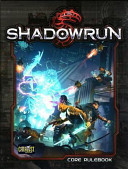RPG as Theater, Storytelling, and Game
A roleplaying game is part improvisational theater, part storytelling, and part game. It is played by a gamemaster who runs the game and a group of players who pretend to be characters. These characters are created by the players, given a history and personality, and then further defined by a set of statistics that represent the character’s skills and attributes as developed in the character creation process (see Creating a Shadowrunner, p. 80). The gamemaster presents the setting and situation; through their characters, the players interact with the storyline and other characters.
Think of it this way: everyone has read a book or seen a movie in which the lead character does something that the reader or viewer finds so utterly wrong that he or she wants to shout out a warning. But no matter what we say, the character will do what the plot demands; we’re just along for the ride. Even throwing popcorn won’t help.
In a roleplaying game, the players control their characters’ actions and respond to the events of the plot. If the player does not want his or her character to go through the door, the character will not. If the player thinks the character can talk him- or herself out of a tight situation rather than resorting to that trusty pistol, he or she can talk away. The script, or plot, of a roleplaying game is flexible, always changing based on the decisions the players make as characters.
Notes:
Folksonomies: rpg role-playing game
Taxonomies:
/hobbies and interests/games/role playing games (0.559954)
/technology and computing/consumer electronics/tv and video equipment/video players and recorders/dvd players and recorders (0.365448)
/food and drink/food/candy and sweets (0.344545)
Keywords:
character creation process (0.910201 (positive:0.557530)), roleplaying game (0.846789 (positive:0.341129)), characters (0.739939 (positive:0.229208)), players (0.648688 (positive:0.258150)), improvisational theater (0.607422 (neutral:0.000000)), trusty pistol (0.574640 (negative:-0.357059)), tight situation (0.566766 (negative:-0.357059)), players interact (0.531106 (neutral:0.000000)), plot demands (0.526761 (negative:-0.215486)), lead character (0.514190 (negative:-0.698910)), gamemaster (0.410973 (neutral:0.000000)), storytelling (0.322031 (neutral:0.000000)), Shadowrunner (0.246701 (positive:0.350152)), popcorn (0.202585 (positive:0.428099)), RPG (0.201177 (neutral:0.000000))
Concepts:
Character (0.935581): dbpedia | freebase
Role-playing game terms (0.868175): dbpedia | freebase
Storytelling game (0.852687): dbpedia | freebase
Role-playing game (0.796220): dbpedia | freebase | opencyc
Plot (0.789203): dbpedia | freebase | yago
Narrative (0.754363): dbpedia | freebase | opencyc
Fiction (0.744444): dbpedia | freebase
Players (0.734049): dbpedia






